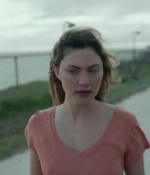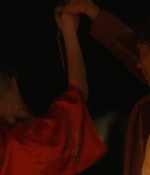We all have moments in life we wish we could change and lifelong desires we never seem to be able to fulfil. But in the Stan original series Bloom, a mysterious berry gives characters the opportunity to be young again and fix their regrets.
On the surface it’s an appealing concept and something Bloom’s cast have been thinking a lot about, though few would actually eat the berry.
In Season 1 of Bloom, it was Brown’s character Ray who discovered the power of the berry when his sick dog ate it and became a puppy again. Ray then gave the magical fruit to his wife Gwen, who has Alzheimer’s disease, in the hope it would make her well, and she transformed into her younger self but with all her adult memories intact. However, the berry left Gwen with an all-consuming desire to have the child she never had, which didn’t end well.
When Season 2 picks up, Gwen has again reverted to her younger self but the power of the new generation of berries lasts even longer. Now Gwen is desperate to find one for Ray so that he can be young with her.
And news of the berries has spread, bringing new characters to town, all with their own varying interests in the berry. One of them is Ben Garneau, a geneticist brought to town by former bio-tech CEO Anne Carter, who wants to uncover the berries’ healing properties.
While the Bloom cast is certain of the path they’d take if faced with a similar dilemma to their characters, no one ever really knows what they will do in any given situation until it occurs. But as the story shows, regret is a dangerous beast and that’s why there’s another theme this season that will resonate more powerfully.
“I think that acceptance of what you have in front of you [is something viewers will take away from this season],” said Phoebe Tonkin who plays young Gwen. “I think we all, whether it’s on our phones or with technology, we’re always looking elsewhere and we’re not looking what right in front of us.
“I’m not someone that really dwells on the past and I definitely do try to live moment by moment.”
Published April 2020
by Rachael Gavin
Source












